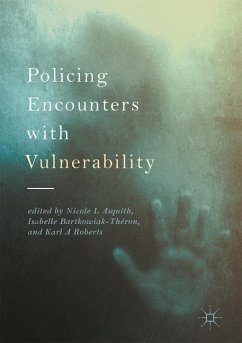This edited collection brings together scholars and practitioners to consider the ways in which policing organisations approach vulnerability and the strategies they develop to reduce victims, offenders and police officers' susceptibility to increased harm. Based on their work with policing services, the public criminologists and critical policing scholars collected together in this edited volume consider vulnerability in terms of people, processes, and institutional practices. While more attention is being paid to some experiences of vulnerability - particularly at the later stages of the criminal justice process - this collection will be the first to focus on the specific issues faced by policing services as the front end of criminal justice. The case studies of vulnerability in each chapter offer the reader new insights into the operational concerns in working with vulnerable people (including vulnerable police officers). This collection is ideally suited for scholars of applied criminal justice studies (including policing studies), police recruits and officers in training, and policing practitioners such as policy and program development officers.
Bitte wählen Sie Ihr Anliegen aus.
Rechnungen
Retourenschein anfordern
Bestellstatus
Storno








